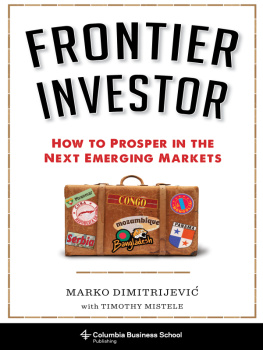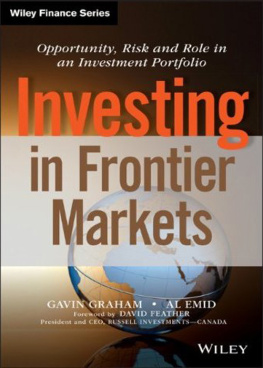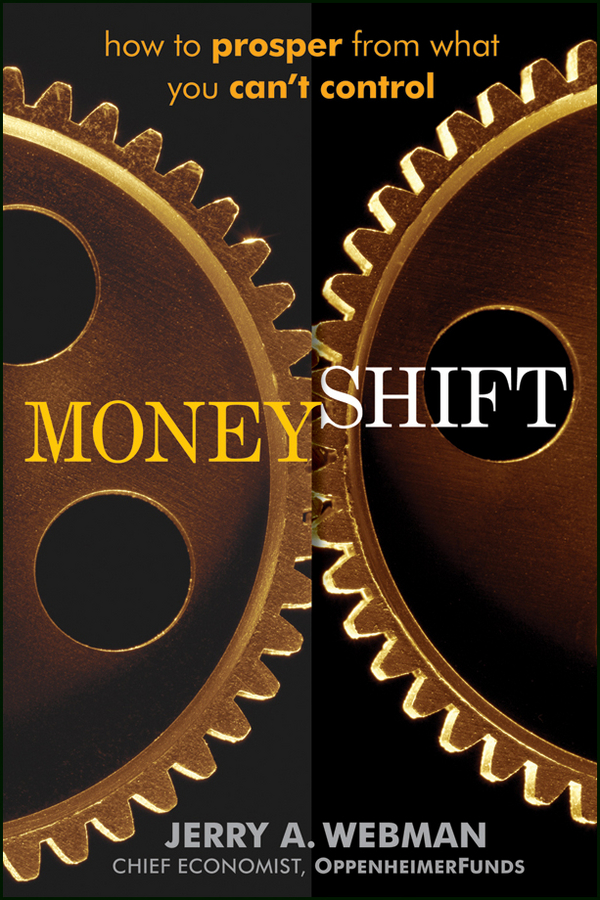Contents

Copyright 2012 by Jerry Webman. All rights reserved.
Published by John Wiley & Sons, Inc., Hoboken, New Jersey.
Published simultaneously in Canada.
No part of this publication may be reproduced, stored in a retrieval system, or transmitted in any form or by any means, electronic, mechanical, photocopying, recording, scanning, or otherwise, except as permitted under Section 107 or 108 of the 1976 United States Copyright Act, without either the prior written permission of the Publisher, or authorization through payment of the appropriate per-copy fee to the Copyright Clearance Center, Inc., 222 Rosewood Drive, Danvers, MA 01923, (978) 750-8400, fax (978) 646-8600, or on the Web at www.copyright.com . Requests to the Publisher for permission should be addressed to the Permissions Department, John Wiley & Sons, Inc., 111 River Street, Hoboken, NJ 07030, (201) 748-6011, fax (201) 748-6008, or online at http://www.wiley.com/go/permissions .
Limit of Liability/Disclaimer of Warranty: While the publisher and author have used their best efforts in preparing this book, they make no representations or warranties with respect to the accuracy or completeness of the contents of this book and specifically disclaim any implied warranties of merchantability or fitness for a particular purpose. These materials may not be used to create any warranty. The advice and strategies contained herein may not be suitable for your situation. You should consult with a professional where appropriate. Neither the publisher nor author shall be liable for any loss of profit or any other commercial damages, including but not limited to special, incidental, consequential, or other damages.
Dow Jones Indexes is the marketing name and a licensed trademark of CME Group Index Services LLC (CME Indexes). Credit Suisse is a service mark of Credit Suisse Group AG. Dow Jones, Dow Jones Indexes, and Dow Jones Credit Suisse Hedge Fund Indexes are service marks of Dow Jones Trademark Holdings LLC or Credit Suisse Group A, as the case may be, and have been licensed for use by CME Indexes.
For general information on our other products and services or for technical support, please contact our Customer Care Department within the United States at (800) 762-2974, outside the United States at (317) 572-3993 or fax (317) 572-4002.
Wiley also publishes its books in a variety of electronic formats. Some content that appears in print may not be available in electronic books. For more information about Wiley products, visit our web site at www.wiley.com .
Library of Congress Cataloging-in-Publication Data:
Webman, Jerry A., 1949
Moneyshift : how to prosper from what you cant control / Jerry Webman.
p. cm.
Includes index.
ISBN 978-1-118-18140-9 (cloth)
1. Portfolio management. 2. Investments. 3. Wealth. I. Title.
HG4529.5.W433 2012
332.6dc23
2012004766
For Susan
Acknowledgments
For over 30 years Ive read with pride and pleasure the acknowledgments authors have addressed to my agent, Susan Ginsburg. The descriptions have a pattern: supportive, tough, fair, funny, creative, loyal, persistent, brilliant, even Superwoman. I repeat them all with emphasis and add my own: beloved. Thanks for kicking me in the pants until I wrote this thing.
I also thank Susan Webman and our four wonderful children, Anna, Rachel, Aaron, and Josh, for contributions to this effort that are as varied as they are.
Many colleagues at OppenheimerFunds have contributed ideas both broad and detailed to the book. I hope Ive done them justice. I particularly want to thank Brian Levitt, Lori Heinel, Ashley Felden, James Mehring, Tim Horsburgh, Sarah Beaumont, Sarah Busch, Eliot Walsh, Diane Frankenfield, Ari Gabinet, the Global Equity team (who will recognize the influence of their MANTRA), Alice Fricke, Mike Quinn, Jodi Rabinowitz, Jim OConnell, and Erin Brunswick, as well as Marty Willis for her support of the project. Bill Glasgall generously contributed both his financial knowledge and his editorial skills to the final manuscript. Leonard Mlodinow rescued me from several errors in physics, demographics, and logic.
Leonard Ginsburg has given me many things more important than help for this book, but in this context I thank him for always helping me see financial issues from a practical, human perspective.
I also thank my John Wiley & Sons editors, Debra Englander, Tula Batanchiev, and Kimberly Bernard, for their contributions to the project. Many others will recognize their thoughts represented and no doubt misrepresented throughout. I thank all of them. Finally, many thanks to Susanna Margolis, whose insights, clarity, and perseverance made her help with the manuscript invaluable. Any errors and omissions are my own.
Introduction
Whats Shifting
Did you ever think your ability to pay for your kids college educations would suffer from a generation of Greeks retiring at an age when most of us are still revving up our careers? Or that the airfare you pay to fly from Chicago to Denver would rise and fall according to the overnight borrowing rate set by the Central Bank of Brazil? Did you ever imagine youd care about other people getting home mortgages they had no hope of repaying? Or that youd worry about apartment vacancy rates in Shanghai or the price of onions in New Delhi? Have you wondered why the stock market has a bad case of attention deficit disorder, and why bonds dont pay enough interest to meet the cost of the safe-deposit box you keep them in? Oh, right: that, too, has changed; bond certificates are now wall decorations.
The world is changing, and matters that once seemed remote now shape our livesand certainly our finances. Many of us are frustratedeven angryat the result. Depending on which cable news channel you prefer (where have you gone, Walter Cronkite?), youve heard it all: Blame Wall Street! Blame the Fed! Blame Bush! Blame Obama! Blame Europe! Finding someone to blame is not an investment strategy, and this book is about how to come up with an investment strategy that will succeed in bringing you prosperity in the world as it is now, not as you might wish it to be.
I dont recall a time in which we didnt hear that the pace of change was greater than it had ever been, and certainly, change has always been a constantso constant that its a clich. But sometimes we can recognize that something more fundamental than todays headlines has changed, and when that happens, we need to change with it. We acknowledge that necessity in our realization that the tried-and-true methods arent working so well anymore, in the anger we feel as our expectations are frustrated, and, most importantly, in the success we achieve when we recognize the change and learn to thrive in its wake.
This book is about such a change in the global economy and about the waves that change has churned up in our own lives, especially in the parts of our lives concerned with providing for our financial well-being. Some of us will let those waves of change knock us over; some of us will figure out how to catch a wave or two and ride it back to shore, maybe having a bit of fun on the way. But as this book asserts, if we cannot control those waves, we can still use them to our advantage.
Arriving at the realization that something fundamental has changed and will likely stay that way for some time ranks among the most important and most difficult steps a successful investor can take. I spent almost 30 years of my career as an analyst, portfolio manager, and leader of analysts and portfolio managers. Over those years, the daily flood of financial, economic, and political data went from overwhelming to unfathomable. People like me pay obsessive attention to all this information, misinformation, and disinformation because we both worry and hope that some facts will tell us that an important situation has changed and we need to change our views as a result.







